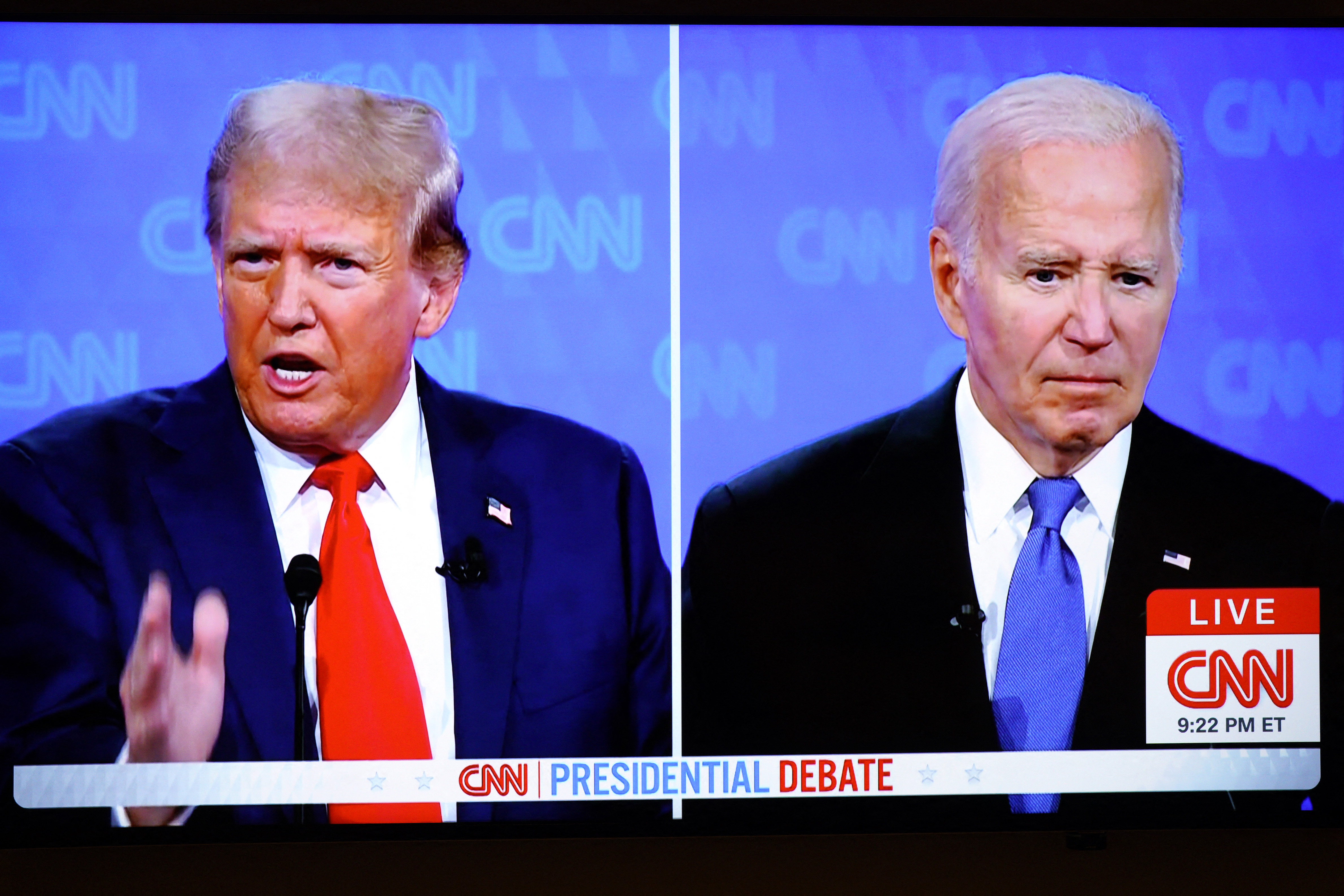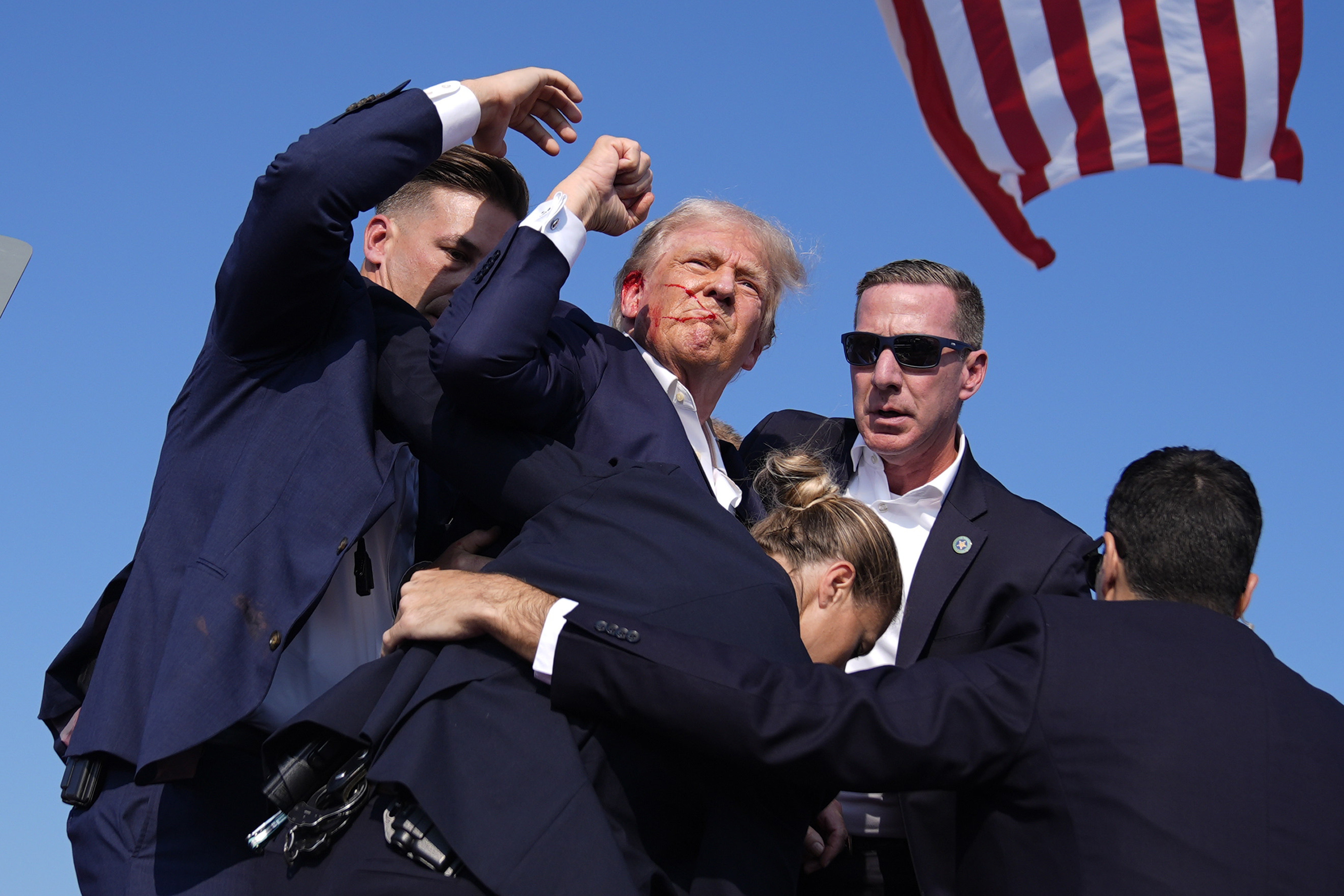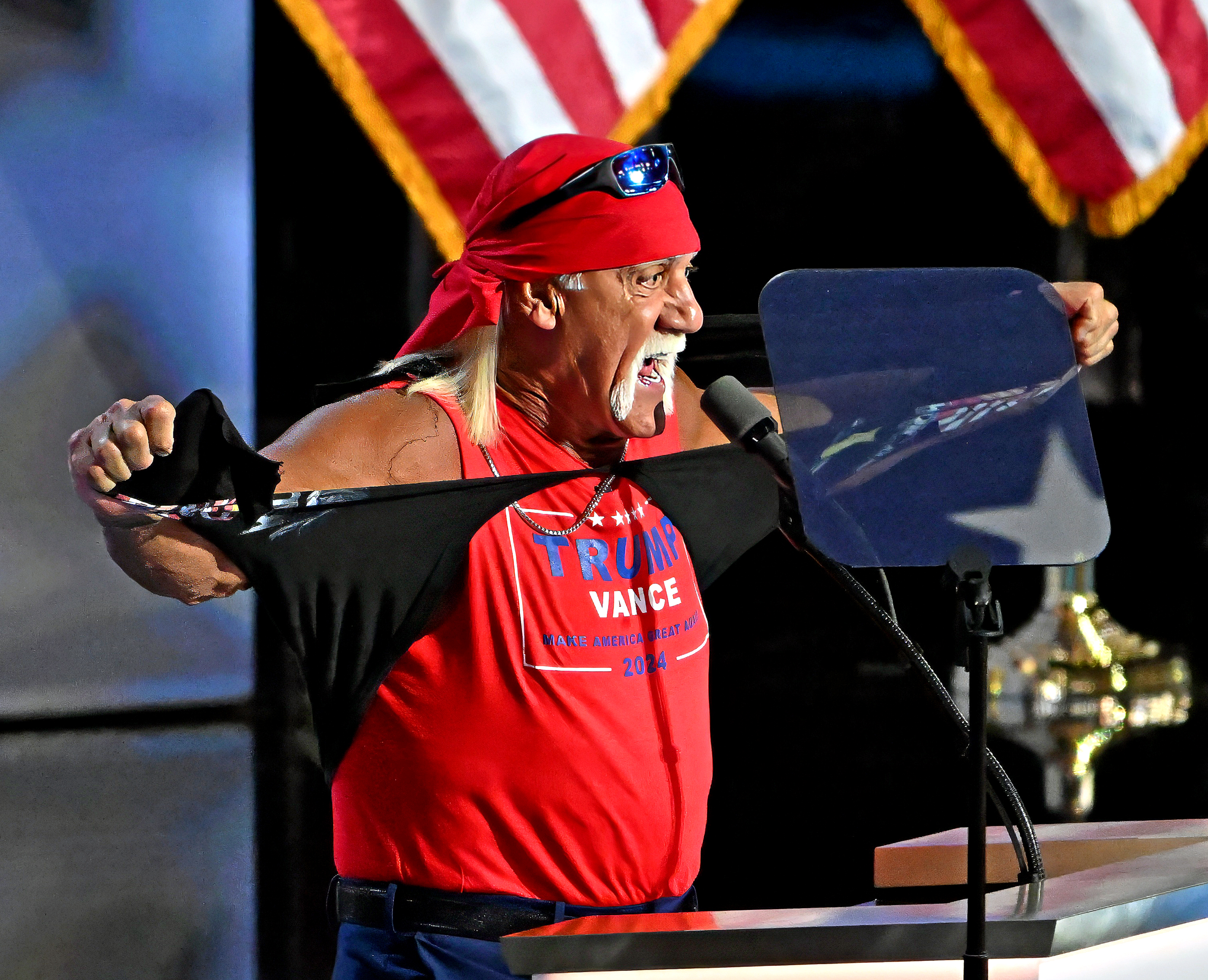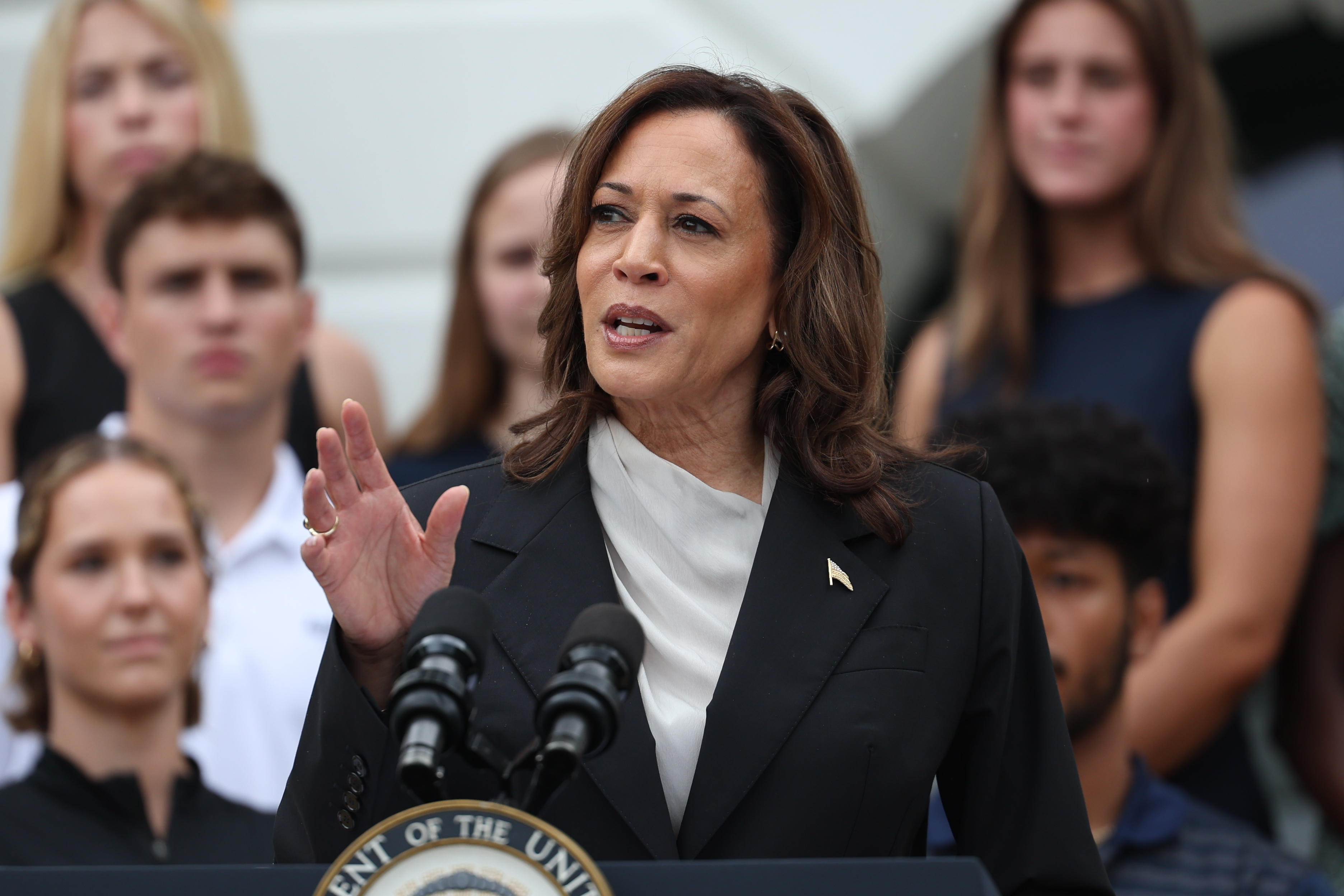
Remember June 27? That was when President Joe Biden delivered his bewildering and bewildered—empty eyes, mouth agape—performance in the now-infamous televised debate against former President Donald Trump.
But as I am writing this, not even a month has gone by. The first presidential debate of 2024 was, instead, merely the starting point of a 24-day stretch during which America watched its political landscape mutate swiftly and irrevocably: a dizzying period of so many unprecedented events that the word may need to be retired because of overuse.
In the weeks, even days, between the debate and Biden’s subsequent decision to exit the 2024 presidential race and endorse Vice President Kamala Harris to lead the Democratic ticket on July 21, there have been stunning Supreme Court decisions, an assassination attempt, and an enthusiastically attended Republican National Convention. Such an abundance of game-changing movements have transpired that it’s difficult to remember them all. So Mother Jones is providing an abridged summary to reassure you that no, really, you’re not the only one who may feel like you can’t keep track of all that has happened.

June 27
The first 2024 presidential debate was supposed to be a slam dunk for Biden, which is part of the reason his campaign pushed for it to be held before the Republican National Convention; the thinking was he could gain early momentum. Trump recently had been found guilty of 34 criminal charges. Moreover, abortion access was polling as one of the top issues for voters, and Trump had appointed the Supreme Court justices who helped topple Roe v. Wade‘s 50-year precedent. In other words, Biden had plenty of material with which to work. But instead of standing up to Trump, Biden looked as if he could barely stand at all. He struggled to complete thoughts, seemed to forget certain words, and within minutes was dominated by a 78-year-old opponent who appeared robust, even while spewing lies. One painful example of Biden’s impairment appeared early. While talking about billionaires and tax rates, Biden said: “Look, if we finally beat Medicare…” before trailing off. All over the country, Democrats wanted to turn it off but couldn’t look away.
The timing of the debate was also meaningful because of another blockbuster news event that morning. The Supreme Court released its opinion on the Emergency Medical Treatment and Labor Act, and reinstated—at least for now—a lower-court ruling permitting Idaho hospitals to provide emergency abortions in limited circumstances without being subject to prosecution under the state’s strict abortion ban. Democrats were counting on Biden coming out strong on abortion rights, and when the subject came up at the debate, he could have owned the moment. Instead, he said something unintelligible about…the border… I think?
“Look, there’s so many young women who have been—including a young woman who just was murdered and he went to the funeral. The idea that she was murdered by – by – by an immigrant coming in and (inaudible) talk about that,” Biden said.
June 28
Even as the public conversation about Biden’s meltdown dominated the news the day after his disastrous presidential debate, the Supreme Court was in the midst of issuing momentous, end-of-term decisions. Loper Bright Enterprises v. Raimondo or Relentless v. Department of Commerce may not ring a bell for the average American, but the court’s decision is one with the broadest implications this year. The justices overturned a 1984 precedent known as the Chevron doctrine that instructed courts generally to defer to a governmental agency’s interpretation of the relevant subject matter, unless Congress had passed a law addressing the issue. Along party lines, the court ruled that the judiciary, rather than issue-specific agencies, could have the final say on all sorts of minutiae in which judges generally do not have expertise. How much air pollution flowing from one state into another, for example, is too much? The elimination of Chevron has now empowered judges to make that decision instead of scientists from the Environmental Protection Agency.
July 1
First thing Monday morning, just before adjourning until October, in a 5-4 decision breaking down as one would expect with the conservative majority ruling, the Supreme Court finally published its opinion on Trump v. United States—otherwise known as the presidential immunity case. The court decided that presidential power entitles a former President to “absolute immunity from criminal prosecution for actions within his conclusive and preclusive constitutional authority,” and to “at least presumptive immunity” from prosecution for all his official acts. As Justice Sonia Sotomayor wrote in her dissenting opinion, the majority decision meant that nearly anything a president does in his official capacity can get a free pass. “When he uses his official powers in any way, under the majority’s reasoning,” she wrote, “he now will be insulated from criminal prosecution. Orders the Navy’s Seal Team 6 to assassinate a political rival? Immune.” The ruling called into question whether Trump can be lawfully convicted for the numerous federal charges he’s facing. Meanwhile, Biden was still suffering from repeated questions about his fitness to lead.
July 2
Biden kept a relatively low profile, but began to offer excuses for his poor performance, including that he was sick during the debate. He told reporters on July 2 that he “wasn’t very smart” for “traveling around the world a couple times” before the debate. To donors, he admitted, “I didn’t listen to my staff ” about traveling too much, “and then I almost fell asleep on stage.” Not everyone bought it. Notably, he made two trips to Europe in June: the first for a D-Day anniversary event and a second for the G7 Summit. The president then flew to Los Angeles for a star-studded fundraiser. (Which later came back to bite him; see the July 10 entry featuring George Clooney.) Biden then retreated to Camp David, where he had stayed for a week immersed in debate preparations. Still, the early drip soon became a deluge, and the first Democratic lawmaker publicly called on Biden to drop out of the 2024 race. Rep. Lloyd Doggett of Texas said he was hopeful Biden would “make the painful and difficult decision to withdraw.”
July 2–5
More requests for Biden to step aside trickled out, including from former Housing and Urban Development Secretary Julián Castro, Arizona Congressman Raúl M. Grijalva, Massachusetts Congressman Seth Moulton, and Illinois Congressman Mike Quigley.
July 5
ABC News anchor George Stephanopoulos conducted the first post-debate television interview with Biden. It wasn’t as cringe-inducing as the president’s June 27 performance, but it wasn’t a clear victory either. Biden was still hoarse and spent much of the interview downplaying and denying questions about his age and stamina.

July 10
July 10 felt a little bit like when Tom Hanks announced—before lockdown—that he had Covid in early March 2020. This time around, superstar and major Democratic fundraiser George Clooney called for Biden to exit the race in a New York Times opinion piece. “We are not going to win in November with this president. On top of that, we won’t win the House, and we’re going to lose the Senate. This isn’t only my opinion; this is the opinion of every senator and Congress member and governor who I’ve spoken with in private,” Clooney wrote. On the same day, Democratic Sen. Peter Welch of Vermont became the first Democratic Senator to publicly say Biden shouldn’t run in 2024.
July 10 felt a little bit like when Tom Hanks announced—before lockdown—that he had COVID in early March 2020. This time around, superstar and major Democratic fundraiser George Clooney called for Biden to exit the race in a New York Times opinion piece.
July 11
With more calls for Biden to drop out came more scrutiny. At the NATO summit in Washington on July 11, Biden accidentally referred to Ukrainian President Volodymyr Zelensky as the Russian President who Zelensky currently faces in war. “And now I want to hand it over to the president of Ukraine, who has as much courage as he has determination, ladies and gentlemen, President Putin,” Biden said, before quickly correcting himself. Oops. In attempting to speak about Vice President Kamala Harris, Biden mistakenly called her “Vice President Trump.” Oops again.
At least eight members of Congress, including Hillary Scholten of Michigan and Jim Hines of Connecticut, joined the growing chorus of Biden 2024 defectors.

July 13
Just when US politics reached what felt like a new level of crazy, a 20-year-old man fired shots at former president Trump from a rooftop 150 meters away at a Saturday rally in Butler, Pennsylvania. The bullet grazed Trump’s ear and came within an inch of ending his life. One rally attendee, a volunteer firefighter who was protecting his family, was killed and two others were seriously injured. Immediately, members of the far-right blamed Democrats and their rhetoric for the shooting. The Biden campaign paused its advertisements as the president made multiple addresses to the nation, disavowing political violence.
Senate Majority Leader Chuck Schumer also met with Biden in Delaware on July 13. Though it would not be reported for several more days, Schumer urged Biden to consider dropping out. To which Biden reportedly said, “I need another week.”
July 15
Having quickly gotten to his feet after being injured at the July 13 rally, Trump emerged from the assassination attempt with a bandaged ear and a renewed appearance of vitality. Within two days of the shooting, Trump notched a couple more wins: District Judge Aileen Cannon—a controversial Trump appointee—dismissed the criminal case that alleged Trump had improperly stored classified documents and then attempted to cover up his tracks. (Special counsel Jack Smith’s office says it will appeal the decision.) Out of numerous indictments, some experts thought the classified documents case was the strongest one to be made against Trump.
On the same day, the Republican National Committee convened in Milwaukee, Wisconsin to formally nominate Trump as the party’s presidential candidate. To great fanfare, Trump also announced his running mate selection of Sen. J.D. Vance (R-Ohio).
In the interim, Biden sat down for another television interview—this time with Lester Holt. In it, he sounded slightly less ill but even more intransigent. “Come and talk to me about what we should be talking about,” he told Holt, presumably meaning that the subject should be Trump and not his own political future.
July 17
As the Biden campaign continued to try to reject rumors that he was too old and frail to serve another four-year term, the White House announced the president had tested positive for Covid and would be self-isolating at his home in Rehoboth Beach, Delaware.
In his address accepting the nomination at the RNC, Vance tried to appeal to “forgotten communities” and the plights of the working class, which he blamed on big corporations and Democrats sending jobs overseas.
July 17 was also the day that Rep. Adam Schiff, a close ally of former House Speaker Nancy Pelosi and a fellow member of the California delegation, said Biden should remove himself from the equation.

July 18
Former president Trump, now the official GOP nominee for president, followed a testosterone-filled array of speakers like Hulk Hogan and Tucker Carlson to deliver the longest convention speech ever. After a 20-minute emotional retelling of the assassination attempt against him, Trump started Trumping again, and spent the next 70 minutes rambling about an “immigrant invasion” and how Biden is one of the “worst presidents in the history of the United States.”
Former president Trump, now the official GOP nominee for president, followed a testosterone-filled array of speakers like Hulk Hogan and Tucker Carlson to deliver the longest convention speech ever.
CNN reported that Pelosi and Biden had a testy phone call in which she advised the president that staying in the race would destroy Democrats’ chance of reclaiming the House and securing the Senate in November.
July 19
By this point, the floodgates of dissent had overwhelmed Biden’s shrinking chances of becoming the nominee. Sen. Sherrod Brown (D-Ohio) and Martin Heinrich (D-NM), as well as at least nine more members of the House called for Biden to drop out.

July 21
Still recovering from Covid and in quarantine, Biden released a letter Sunday afternoon announcing he was pulling out of the race. “It has been the greatest honor of my life to serve as your President. And while it has been my intention to seek reelection, I believe it is in the best interest of my party and the country for me to stand down and to focus solely on fulfilling my duties as President for the remainder of my term,” he wrote.
Shortly thereafter, Biden endorsed his vice president to replace him at the top of the Democratic ticket. Kamala Harris, 59, is now expected to be the Democratic nominee who will run against the oldest-ever, major-party-nominated presidential candidate: 78-year-old Donald Trump. The Democratic convention will be in Chicago beginning August 19.
No telling what will happen between now and then.
Top image credits: Ting Shen/CNP/ZUMA; Evan Vucci/AP; Gripas Yuri/Abaca/ZUMA; Mark Reinstein/ZUMA















